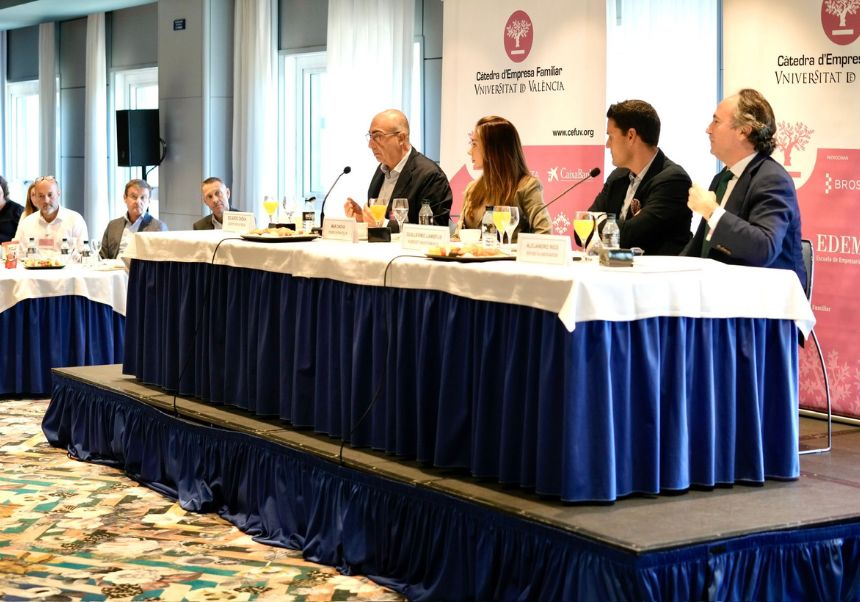
Valencia, 1 October 2024. The Chair of Family Business of the University of Valencia (CEFUV), promoted by the Valencian Association of Entrepreneurs (AVE), EDEM Business School, the Valencian Institute for the Study of Family Business (IVEFA), the Institute of Family Business (IEF) and the University of Valencia (UV), and sponsored by CaixaBank and Broseta, organised a breakfast-talk focused on re-entry from the perspective of two cases of family businesses (Korosti Investments and Grupo Chova Felix) which, after the sale of their companies, have decided to embark on new projects.
For this, the CEFUV counted on the participation of Guillermo Lamsfus, director of Korosti Investments, Eduardo Chova, partner of Grupo Chova Felix and Mar Chova, director of Investments of Grupo Chova Felix. The three of them shared their experiences about the motivations that led them to start up again, the training and preparation actions for this new stage, the nature of their new projects and the challenges they had to face.
To begin with, Alejandro Ríos, managing partner of Broseta lawyers (Valencia) and moderator of the discussion, opened the discussion by introducing the speakers and highlighted the importance of the topic addressed: ‘What will the day after selling the family business be like? and the evolution of the family business into an entrepreneurial family.
The participants then narrated the history of their companies up to the moment of the sale of the family business. Guillermo Lamsfus emphasised the importance of preparation prior to the sale of the company, stressing that the ability to adapt is key in the business world: ‘an entrepreneur never stops pivoting, learning through trial and error’. In addition, he pointed out that, although he has sold his business, the entrepreneurial spirit is still alive: ‘The purpose of a business project is the incentive that motivates you day by day, beyond the economic value’. He also stressed that training is crucial, whether through mentoring or learning from other family offices, which allows you to gain experience and learn about best practices.
For her part, Mar Chova, a member of the third generation, spoke about the relevance of family unity in the process of re-entry: ‘One of the reasons why we sold was to unite the family in a project where we could all work together, contributing value and sharing our enthusiasm for new challenges’. He also stressed that collaboration between generations is fundamental to ensure success in family projects: ‘The fact that previous generations have allowed us to have a seat at the table has made us feel much more involved and has given us a sense of belonging, as well as helping us to have a much more complete understanding and vision of the decisions’.
In addition, Mar pointed out the importance of professionalisation and internationalisation as key elements for the transition to new projects: ‘The most important thing is to surround yourself with the best international teams to accompany you during the transition to a new stage. They are travelling companions with whom you build relationships based on trust and, of course, on results’.
Guillermo Lamsfus wanted to emphasise that entrepreneurship is essential in order not to devalue oneself as an entrepreneur. He also stressed that it is crucial that the older generation knows how to step aside with generosity, allowing the new generations to lead: ‘You have to avoid staying in the ivory tower, you have to be hungry to go out and work hard’.
Eduardo Chova, for his part, shared that ‘the development of a business activity has always been present in all the stages we have gone through. This is reflected both in the management of our investee companies and in the way we have decided to manage the Family Office. For us, as a family, it has always been important that the entrepreneurial and entrepreneurial spirit is maintained in every area of investment, and that family values are reflected in everything we do’.
Mar also underlined the lack of cohesion at national level: ‘We lack a sense of community at national level. Fortunately, this has started to change. Not only because of the clear generational handover, but also because many organisations and family groups have been actively working to build this ecosystem. There are more and more of us, and this emerging collaboration is key not only for the proper preservation and growth of capital, but also for the proper creation of value in all areas: both social and economic’.
Finally, Alejandro Ríos concluded the breakfast-talk by summarising some of the main messages and lessons learned, stressing that ‘preparation and training are essential, not only through books, but also by surrounding oneself with good professionals. We must avoid self-sufficiency and be humble enough to learn from others.








